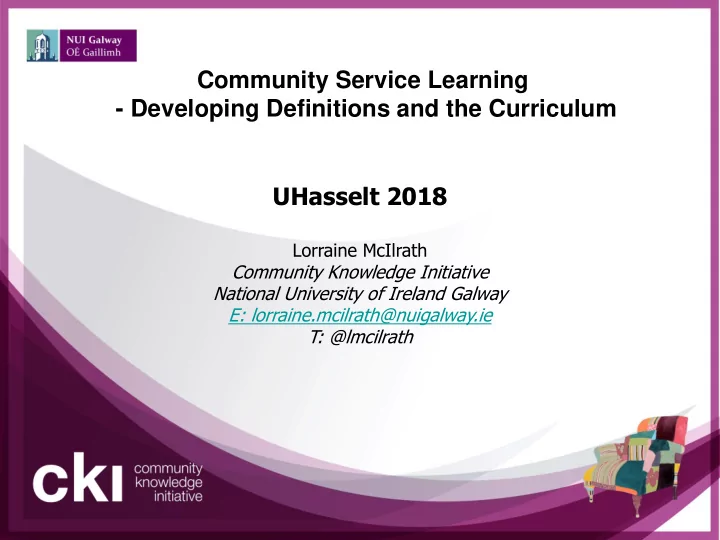

Community Service Learning - Developing Definitions and the Curriculum UHasselt 2018 Lorraine McIlrath Community Knowledge Initiative National University of Ireland Galway E: lorraine.mcilrath@nuigalway.ie T: @lmcilrath
Introduction Understand service learning as a pedagogical approach, the myriad of definitions that exists within the literature; Will have begun to craft a definition that aligns with their cultural context and curriculum; Have some fun!
Civic Engagement The concept of ‘ civic engagement ’ in higher education encompasses a wide range of approaches to develop the civic skills, interests and participation of students, staff and institutional management. Examples include community-based learning (or ‘ service learning ’ ), volunteering, community-focussed research, participative and collaborative research and educational initiatives etc. Such initiatives commonly reflect the norms and values of reciprocity and diversity and are often explicitly linked to social inclusion. Gonzalez-Perez et al. (2007).
Community Adult & Continuing Education; Distance & Online Learning; Access Research on & Recruitment of diverse Learners; civic issues Community Volunteering Fellowships . Knowledge Sharing; Economic Collaborative Regeneration; Service Learning/ research Access to Community Based activities Teaching & Learning Research Infrastructure; Learning Probono Advice; Board Representation (Internal & External) Service/Other
Defining Service Learning “ … an academic strategy that seeks to engage students in activities that enhance academic learning, civic responsibility and the skills of citizenship, while also enhancing community capacity through service. ” (Furco and Holland, 2004, 27) ‘ seeks to develop in students an ethos of civic and social responsibility – an understanding of the engaged role individuals must play if communities and democracies are to flourish ” (Zlotkowski, 2007:43) “ a form of experiential education that combines structured opportunities for learning academic skills, reflection on the normative dimensions of civic life, and experiential activity that addresses community needs or assists individuals, families and communities in need ” (Hunter & Brisbin, 2000, 623) ‘ definitional anarchy ’ (Sandmann, 2008)
Service-learning (sometimes referred to as community based or community engaged learning) is an innovative pedagogical approach that integrates meaningful community service or engagement into the curriculum and offers students academic credit for the learning that derives from active engagement within community and work on a real world problem. Reflection ad experiential learning strategies underpin the process and the service is linked to the academic discipline. (Europe Engage, 2015)
Rationale …... • EU Higher Education Policy Landscape – little knowedge on ‘ local collective experiements ’ (Masschelein & Simons, 2009). Active citizenship has been defined by the EU as the ‘ cultural, economic, political/democratic and/or social participation of citizens in society as a whole and in their community. ’ (Commission of the European Communities, 2001, p31) Biesta argues for ‘ the development of a truly European citizenship ’ as ‘ an articulation of citizenship that is more political than social, more concerned about collective than individual learning, that acknowledges the role of conflict and contestation, and that is less aimed at integration and reproduction of the existing order but also allows for forms of political agency that question the particular construction of the political order ’ (2009, p154).
Methodology • research inquiry is qualitative and my goal was to ‘ see through the eyes ’ of the alidades engaging them in a series of ‘ close ’ encounters (Bryman, 1984, p78). • Presidents, Students, Academics, Community Partners and Coordinating Centres Personnel (Furco, 2002; NCCPE EDGE Tool, 2018) . • Semi Structured and Going Along Interviews • Cultural Historical Community of Practice Theory (Wenger, 1998; Vygotsky) • Thematic Analysis (Clarke and Braun, 2013a; 2013b)
Findings • Special terms for service learning have been crafted in each site of inquiry that relate to cultural and historical context. • deliberately decided not to adopt or use the term service learning • Post-communist underpinnings have influenced the coining of the term društveno korisno učenje (socially useful learning) as a reaction against the negatively perceived communist practice of Subbotnik • Imperial or post-colonial influences underpin the pedagogy at the Modern University of Flanders and New University of England USA and South African influences)
Characteristics • Learning linked to academic discipline; • Integration of theory and practice; • Theory viewed in a real world context; • Enhancement of Community University Partnerships; • Credit awarded for the learning (not time within the community); • Reflection strategies underpin the process; • Community becomes a teaching tools and partner; • Experiential learning underpins the process; – the chameleon (Boland and McIlrath, 2012)
Cultural Drivers - Ireland Our history – Famine of 1850s, Colonisation, Country of division and conflict 1969 to 1996 (peace process) Connection to Community – Meitheal (farming) Island People and Survival Immigration and concerns for others in crisis – led to charitable forms of giving internationally – many international Irish NGO ’ s
Chameleon
Groups Work Questions 1 – What are the cultural and historic drivers and rationale for community service learning at UHasselt? Place on Post Its on the Wall!
Groups Work Questions 2 – While looking/studying the Post Its, might it be possible to craft a culturally appropriate definition of Community Service Learning?
Research to Date – general findings • SL has + impact on student personal/interpersonal development; • SL + Impact on cultural understanding and reducing stereotyping; • Instils commitment to service: • + Impact on academic learning (Students and Academics) & understanding of discipline in real world context • Contributes to career development • SL improves student satisfaction with institution & more likely to graduate • Academic satisfactions with quality of student learning • Lack of resources pressing concern for academics • Lack of academic reward is a barrier to implement SL • Community Findings (satisfaction with students, service is useful and enhances university relations)
Recommend
More recommend